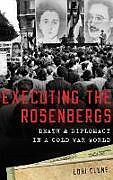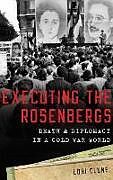Executing the Rosenbergs
Einband:
Fester Einband
EAN:
9780190265885
Genre:
History
Autor:
Clune Lori
Herausgeber:
OUP USA
Erscheinungsdatum:
26.05.2016
Zusatztext Balanced, yet provocative, Executing the Rosenbergs tells a compelling story about the global ramifications of one of the Cold War's most enduring controversies. Readers familiar with the tale of the Cold War's most famous atomic spies will learn much from the wealth of new insights and information Lori Clune brings to the table. Newcomers to the Rosenberg case will find in these pages a gripping, compelling, and accessible narrative -- one free of the polarizing tint that has colored other historical writings on the case. Informationen zum Autor Lori Clune is Associate Professor of History at California State University, Fresno. Klappentext An original study based on never before seen State Department documents, this book examines reactions around the world to the execution of Ethel and Julius Rosenberg. Zusammenfassung An original study based on never before seen State Department documents, this book examines reactions around the world to the execution of Ethel and Julius Rosenberg. Inhaltsverzeichnis Preface Introduction Ch 1: Truman Ch 2: Transition Ch 3: Eisenhower Ch 4: Execution Ch 5: Reverberations Conclusion Notes Bibliography
Autorentext
Lori Clune is Associate Professor of History at California State University, Fresno.
Klappentext
An original study based on never before seen State Department documents, this book examines reactions around the world to the execution of Ethel and Julius Rosenberg.
Inhalt
Preface
Introduction
Ch 1: Truman
Ch 2: Transition
Ch 3: Eisenhower
Ch 4: Execution
Ch 5: Reverberations
Conclusion
Notes
Bibliography

Leider konnten wir für diesen Artikel keine Preise ermitteln ...
billigbuch.ch sucht jetzt für Sie die besten Angebote ...
Die aktuellen Verkaufspreise von 6 Onlineshops werden in Realtime abgefragt.
Sie können das gewünschte Produkt anschliessend direkt beim Anbieter Ihrer Wahl bestellen.
Loading...
Die aktuellen Verkaufspreise von 6 Onlineshops werden in Realtime abgefragt.
Sie können das gewünschte Produkt anschliessend direkt beim Anbieter Ihrer Wahl bestellen.
| # | Onlineshop | Preis CHF | Versand CHF | Total CHF | ||
|---|---|---|---|---|---|---|
| 1 | Seller | 0.00 | 0.00 | 0.00 |
